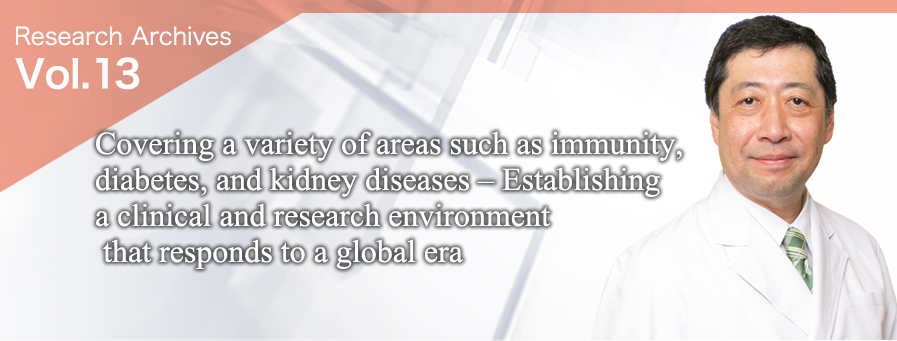
Department of Rheumatology Endocrinology and Nephrology, Graduate School of Medicine, Hokkaido University
Tatsuya Atsumi, M.D., Ph.D. Internal
Medicine
- 1988: Graduated from Hokkaido University School of Medicine, joined the Second Department of Internal Medicine, Hokkaido University Graduate School of Medicine.
- 1992: Completed Hokkaido University Graduate School of Medicine (Doctor of Medicine degree) and started working in Internal Medicine Department at Tomakomai City Hospital in October.
- 1994: Postdoctoral fellowship at the Lupus Research Unit, Rayne Institute, St. Thomas' Hospital, London, England.
- 1997: Medical staff in the Second Department of Internal Medicine at the Hokkaido University Hospital. Subsequently, assistant professor, lecturer, associate professor.
- 2012: Appointed professor, to the present.
Working on original themes for which there are few research facilities in Japan.
The Department of Rheumatology, Endocrinology, and Nephrology is proud of its history of more than 90 years, since its founding as a lectureship in 1923. Now, with Professor Tatsuya Atsumi as the sixth department head, the department mainly performs research in three fields: rheumatic diseases, diabetes and endocrinology, and nephrology. The barriers among the groups have traditionally been low, and there is always smooth communication within the research lab.
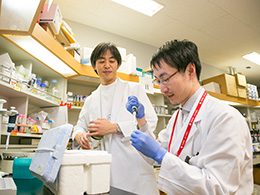 In the rheumatology group led by Lecturer Shinsuke Yasuda, research into antiphospholipid syndrome, one type of autoimmune disease, has continued for many years. This is an autoimmune disease characterized by ease of thrombosis formation. There are few other research facilities in Japan focused on this syndrome, so this is the top clinical and research group for this disease in Japan. Also, with regard to the pathogenic mechanisms and the pathology of systemic lupus erythematosus, a representative autoimmune disease, and rheumatoid arthritis, a common chronic autoimmune disease affecting a large number of patients, research is being conducted in the translational area that connects fundamentals with clinical practice. Clinical research into systemic autoimmune diseases that are rare and intractable leads to evidence that will help to improve the treatment of patients.
In the rheumatology group led by Lecturer Shinsuke Yasuda, research into antiphospholipid syndrome, one type of autoimmune disease, has continued for many years. This is an autoimmune disease characterized by ease of thrombosis formation. There are few other research facilities in Japan focused on this syndrome, so this is the top clinical and research group for this disease in Japan. Also, with regard to the pathogenic mechanisms and the pathology of systemic lupus erythematosus, a representative autoimmune disease, and rheumatoid arthritis, a common chronic autoimmune disease affecting a large number of patients, research is being conducted in the translational area that connects fundamentals with clinical practice. Clinical research into systemic autoimmune diseases that are rare and intractable leads to evidence that will help to improve the treatment of patients.
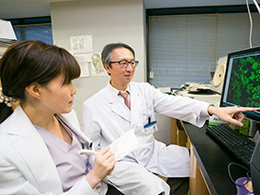 In the diabetes and endocrinology group led by Clinical Associate Professor Hideaki Miyoshi, basic research is being conducted in three fields: (1) obesity and atherosclerosis, (2) pancreatic β cells, and (3) endocrinology. The group is certified as an educational organization of the respective specialist associations for diabetes, endocrinology, obesity, and atherosclerosis, and are working on the education of medical specialists in order to deliver the best treatment to patients. We are especially devoting our efforts to clinical research, and not just the graduate students but also all group members have individual research themes, and are conducting clinical research. We aim for high-quality clinical research in order to establish evidence, and with the strong support of many doctors throughout Hokkaido, who are alumni of the group, we have been able to proceed very quickly with multicenter research studies.
In the diabetes and endocrinology group led by Clinical Associate Professor Hideaki Miyoshi, basic research is being conducted in three fields: (1) obesity and atherosclerosis, (2) pancreatic β cells, and (3) endocrinology. The group is certified as an educational organization of the respective specialist associations for diabetes, endocrinology, obesity, and atherosclerosis, and are working on the education of medical specialists in order to deliver the best treatment to patients. We are especially devoting our efforts to clinical research, and not just the graduate students but also all group members have individual research themes, and are conducting clinical research. We aim for high-quality clinical research in order to establish evidence, and with the strong support of many doctors throughout Hokkaido, who are alumni of the group, we have been able to proceed very quickly with multicenter research studies.
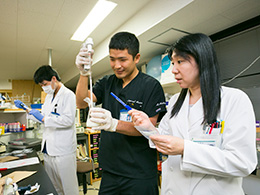 The most outstanding feature of the nephrology group led by Clinical Associate Professor Saori Nishio is its research into the genetic kidney disease called polycystic kidney disease (PKD). There are almost no related research institutions in Japan, and this group is the only facility that has pure knockout mice for PKD (genetically modified mice in which one or more genes have been deactivated). Since there are few specialist centers, ADPKD patients are drawn to us, and we achieve leading-edge research results based on a large volume of data. PKD has recently been designated as an intractable disease, and the rate of patients is believed 1 out of 4,000 persons in Japan today. Therefore, there are great expectations for improving the technology for detecting and diagnosing this disease, and for developing and distributing the therapies.
The most outstanding feature of the nephrology group led by Clinical Associate Professor Saori Nishio is its research into the genetic kidney disease called polycystic kidney disease (PKD). There are almost no related research institutions in Japan, and this group is the only facility that has pure knockout mice for PKD (genetically modified mice in which one or more genes have been deactivated). Since there are few specialist centers, ADPKD patients are drawn to us, and we achieve leading-edge research results based on a large volume of data. PKD has recently been designated as an intractable disease, and the rate of patients is believed 1 out of 4,000 persons in Japan today. Therefore, there are great expectations for improving the technology for detecting and diagnosing this disease, and for developing and distributing the therapies.
One of the advantage of this department, with a large number of students, is that the students have the opportunity to get involved in the clinical and research activities at their own pace.
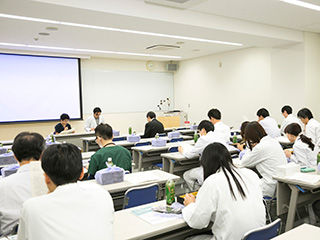 The Department of Rheumatology, Endocrinology, and Nephrology was previously called "Second Department of Internal Medicine", and has been performing integrated clinical and research activities over a wide range of non organ-specific related fields. It can be said that this department provides opportunities for intimate staff interactions, with the sharing of knowledge, technology, and equipment. Further, we have established an environment where clinical and research activities are easy to perform.
The Department of Rheumatology, Endocrinology, and Nephrology was previously called "Second Department of Internal Medicine", and has been performing integrated clinical and research activities over a wide range of non organ-specific related fields. It can be said that this department provides opportunities for intimate staff interactions, with the sharing of knowledge, technology, and equipment. Further, we have established an environment where clinical and research activities are easy to perform.
"A feature of this department is the collaborative working relationship among the three groups here, holding general meetings with the whole department and joint conferences as regular routine activities. We place a high value on training of advisors and collaborators as well as providing the education necessary for conducting research in the graduate school. In order to become an excellent medical specialist it is necessary to be a doctor who understands and practices EBM (evidence-based medicine). Evidence enters the world in the form of publications, experience with actual research is necessary to read the literature, to know the background against which the research has been performed, and to understand how the results have been organized. I am sure that one cannot become a real specialist without conducting one's own research. For this reason as well, I believe it is extremely important to enroll in a graduate school and to perform research for a certain period of time."
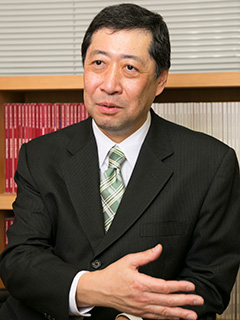
A graduate school has the great advantage that one encounters patients in daily clinical practice, and various questions arise, and one can explore such questions in the environment of the graduate school. Also, in a large department it is possible to have one's research backed up by colleagues when one is temporarily absent from work, such as studying, joint research at other institutions, or maternity leave. In fact, this department has many women doctors, and they can engage in research activities and take care of their family, having a work-life balance.
Also, medical research is now becoming more globalized, and English has become an indispensable skill. The department emphasizes English language education. The students will be able to attain a proficiency in English that will enable them to play internationally leading roles in their field.
"Here, our students will realize research in a sophisticated professional environment, and become expert in clinical examination based on the principles of EBM as well as acquire the skills necessary for coping with the globalization of the field. We expect our students to get to realize their goals as physicians and to improve their career prospects in an environment with a long history of making this possible."
(Interviewed in February 2016)
English seminar, for gaining confidence in making presentations to academic societies and to study abroad.
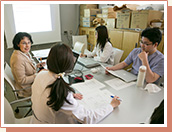 In the Department of Rheumatology, Endocrinology, and Nephrology English seminars are held for graduate students, instructed by Assistant Professor Maria Olga Amengual Pliego. The seminars are held three times per week, and they are one hour in length. The seminars are in English, and slides are used to make presentations, with questions and answers, and discussions after the presentations. All the students, even those who initially find it difficult to speak English, make a great progress in their English skills after attending one year to the seminars. Students improved confidence for speaking in English at international conferences and to study abroad.
In the Department of Rheumatology, Endocrinology, and Nephrology English seminars are held for graduate students, instructed by Assistant Professor Maria Olga Amengual Pliego. The seminars are held three times per week, and they are one hour in length. The seminars are in English, and slides are used to make presentations, with questions and answers, and discussions after the presentations. All the students, even those who initially find it difficult to speak English, make a great progress in their English skills after attending one year to the seminars. Students improved confidence for speaking in English at international conferences and to study abroad.


